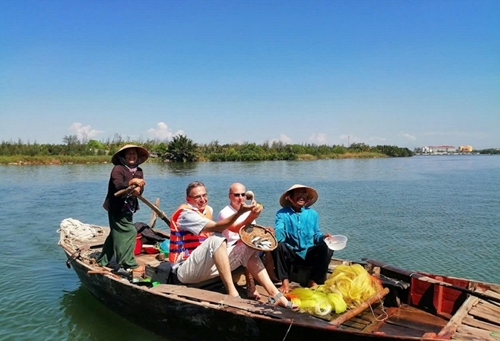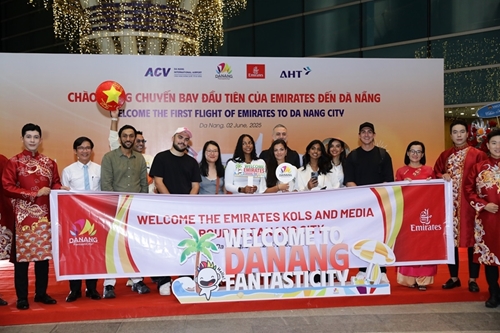At the seminar, which was co-organized by the Ministry of Culture, Sports and Tourism and the Vietnam News Agency in Hanoi, a delegate pointed out a fact that the competition to shape national image is growing increasingly fierce, yet Vietnam's image still falls short of reflecting the country’s achievements.
Awakening the aspiration for development
Over the years, Vietnam has made significant strides in diplomacy, economy, culture, and society. Its global credibility and standing continue to rise, along with growing international confidence in Vietnam’s institution and governance capacity. For those who have traveled abroad or met foreign visitors to Vietnam, these impressions are even more vivid.
    |
 |
|
International tourists experiencing locals' daily lives in Hoi An |
During a meal in the Republic of Korea, instructor Shin Sang Soo, who is in charge of managing and supporting Vietnamese students at Keimyung University, expressed his deep affection for Vietnam, a country he has visited dozens of times. He always looks forward to expanding cooperation with Vietnamese partners.
Similarly, many foreigners are often surprised by Vietnam’s beauty, culture, cuisine, and rapid development. Many years living in Vietnam, Wesley Green from the U.S. said that there are few places where they have seen heads of state ride bicycles, walk freely, enjoy coffee, or eat banh mi on the streets like they do in Vietnam.
However, Vietnam’s national image has yet to fully reflect its aspirations or stature in the new era. Former Vietnamese ambassador to Australia and Demark Luong Thanh Nghi pointed out that despite recent progress, outdated perceptions of impoverished, underdeveloped Vietnam persist. Therefore, according to him, “to change global perceptions, it is necessary to carry out not only practical actions but also well-planned, strategic, and highly persuasive media campaigns.”
Pham Anh Tuan, Director of the Department of Grassroots Information and Foreign Information under the Ministry of Culture, Sports and Tourism, suggested Vietnam tell stories the word want to hear instead of simply telling what Vietnam has.
Sharing the same idea, Deputy Director of the Institute for Brand Strategy and Competition Doan Duc Thuan proposed telling Vietnam’s story of ambition, innovation, and growing global influence.
Strengthening soft power
Vietnam is entering a new era where national branding is no longer a slogan but a key component of soft power that influences investment, partnerships, tourism, and competitiveness.
    |
 |
|
Welcoming first passengers of Emirates' first flight to Da Nang city |
The challenge lies in the way Vietnam’s story is told and its message is conveyed. Ambassador Nghi emphasized that effective national branding requires a clear, consistent message sustained over 5 to 10 years. Vietnam should project the image of a modern, dynamic nation with strong aspirations and active contributions to the world.
From a business view, Director of 5S Media Pham Thu Hang noted that when companies take pride in Vietnam and integrate its image into their packaging, websites, products, and marketing campaigns, they become a massive force in promoting the national brand.
According to Thuan, building a strong national brand requires close collaboration among the government, businesses, and the people. Accordingly, the government should ignite national aspirations and select values aligned with global trends such as creativity, sustainability, peace, and justice. Meanwhile, businesses must build strong individual brands that contribute to the larger national brand. Importantly, every Vietnamese citizen at home or abroad must serve as an ambassador for the country. They should be equipped with knowledge, skills, and stories to tell interesting and convincing story of Vietnam.
National soft power does not come from slogans, but from real values which are told through a global language and the heart of a nation that knows who it is and where it wants to go in this flat world.
Translated by Mai Huong